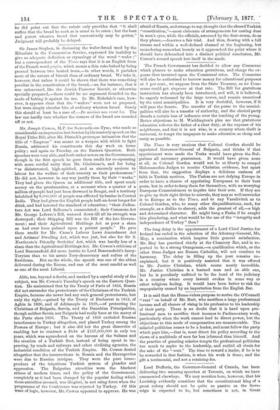Sir James Stephen, in discussing the wafer-bread used by the
Ritualists in the Communion Service, expressed his inability to give an adequate definition or etymology of the word "wafer ;" but a correspondent of the Times says that it is an English form of the French word yaufre, which means a thin cake baked by being pressed between two heated irons,—in other words, it partakes more of the nature of biscuit than of ordinary bread. We take it, however, that unless it could be shown that there was something peculiar in the constitution of the bread,—as, for instance, that it was unleavened, like the Jewish Passover biscuit, or otherwise specially prepared,—there could be no argument founded on the mode of baking it against its use. In Mr. Ridsdale's case, how- ever, it appears clear that the "wafers" were not so prepared, but were simply circular bits of ordinary wheaten bread. Surely this should at least be a case of,—De minimis non curat lex. The law can hardly care whether the corners of the bread are rounded off or not.






































 Previous page
Previous page